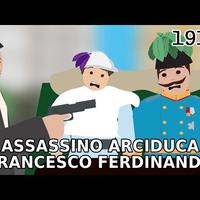L'assassinio dell'Arciduca Francesco Ferdinando a Sarajevo (1914)
|nadvojvode|Franjo|Ferdinand||Sarajevo
Die Ermordung|des Erzherzogs|Franz|Ferdinand||Sarajevo
the assassination|of the Archduke|Francesco|Archduke||Sarajevo
El asesinato|del Archiduque|Francisco|Fernando|en|Sarajevo
اغتيال الأرشيدوق فرانز فرديناند في سراييفو (1914)
Die Ermordung von Erzherzog Franz Ferdinand in Sarajewo (1914)
The assassination of Archduke Franz Ferdinand in Sarajevo (1914)
L'assassinat de l'archiduc François-Ferdinand à Sarajevo (1914)
サラエボにおけるフランツ・フェルディナンド大公暗殺事件(1914年)
De moord op aartshertog Franz Ferdinand in Sarajevo (1914)
Zabójstwo arcyksięcia Franciszka Ferdynanda w Sarajewie (1914)
Assassinato do arquiduque Franz Ferdinand em Sarajevo (1914)
Убийство эрцгерцога Франца Фердинанда в Сараево (1914)
Arşidük Franz Ferdinand'ın Saraybosna'da öldürülmesi (1914)
El asesinato del archiduque Francisco Fernando en Sarajevo (1914)
Sette giovani serbi-bosniaci, facenti parte del movimento nazionalista Giovane Bosnia,
||Srbi|||||pokret|||Bosna
||serbischen|bosnische Serben|die Mitglieder||||nationalistischen||
seven||Serbian|Bosnian|who are part of the nationalist movement Young Bosnia|||movement|nationalist||Bosnian
||صرب|البوسنيون|يعملون|جزء||الحركة|القومي||البوسنة
Siete|jóvenes|||que|parte|del|movimiento|nacionalista|Joven|Bosnia
Sieben junge bosnische Serben, die der nationalistischen Bewegung Junges Bosnien angehören,
Seven young Bosnian Serbs, part of the Young Bosnia nationalist movement,
Sept jeunes Serbes de Bosnie, membres du mouvement nationaliste Young Bosnia,
Siete jóvenes serbio-bosnios, que formaban parte del movimiento nacionalista Joven Bosnia,
pianificarono l'assassinio dell'arciduca Francesco Ferdinando, erede al trono dell'impero austro
|||||naslednik||||austrougarske
sie planten|||||Thronfolger||Thron||österreichischen
خططوا|الاغتيال|للأرشيدوق|فرانشيسكو|فرديناند|وريث||العرش|للإمبراطورية|النمساوي
planearon|el asesinato|del archiduque|Francisco|Fernando|heredero|al|trono|del imperio|austro
planned|the assassination|of the archduke|||heir||throne|of the|Austrian
plante die Ermordung des Erzherzogs Franz Ferdinand, des Thronfolgers der österreichisch-ungarischen Monarchie.
they planned the assassination of Archduke Francesco Ferdinando, heir to the throne of the Austro empire
Avusturya-Macaristan İmparatorluğu tahtının varisi Arşidük Franz Ferdinand'a suikast planladı.
planificaron el asesinato del archiduque Francisco Fernando, heredero al trono del imperio austro
ungarico.
mađarski
ungarisch
المجرية
húngaro
Hungarian
Ungarisch.
Hungarian.
Macarca.
húngaro.
Il primo tentativo in cui venne lanciato una bomba contro l'automezzo fallì.
||pokušaj||||lansirana||bomba|||jeo
||Versuch||||||Bombe||das Fahrzeug|scheiterte
||محاولة||حيث|venne|إطلاق||||المركبة|فشل
El|primer|intento|en|que|fue|lanzada|una|bomba|contra|el vehículo|falló
||attempt||||it was launched||bomb||the vehicle|failed
Der erste Versuch scheiterte, indem eine Bombe in sein Auto geworfen wurde.
The first attempt failed by throwing a bomb into his car.
İlk girişim arabasına bomba atılmasıyla başarısız oldu.
El primer intento en el que se lanzó una bomba contra el vehículo fracasó.
L'attentatore mancò l'obiettivo e venne arrestato.
|propuštio||||uhvaćen
der Attentäter|verfehlte||||verhaftet
المنفذ|أخطأ|الهدف||أُعتُقِل|اعتُقل
El atentador|falló|el objetivo|y|fue|arrestado
The attacker|missed|the target|||arrested
Der Bombenleger verfehlte sein Ziel und wurde verhaftet.
The bomber missed his target and was arrested.
Le bombardier a raté sa cible et a été arrêté.
Bombacı hedefini ıskaladı ve tutuklandı.
El atacante falló el objetivo y fue arrestado.
Non appena l'auto con a bordo l'arciduca, prese una strada secondaria, Gavrilo Princip
|بمجرد||||على متن|الأرشيدوق|أخذ||طريق|ثانوية|غافريلو|برينسيب
|||||na brodu||||||Gavrilo|
Nicht||||||der Erzherzog||||Nebenstraße|Gavrilo Princip|Gavrilo Princip
not||the car|||on board|the archduke|he took|||secondary|Gavrilo|Princip
No|apenas|el auto|con|a|bordo|el archiduque|tomó|una|carretera|secundaria|Gavrilo|Princip
Sobald der Wagen mit dem Erzherzog in eine Seitenstraße einbog, wurde Gavrilo Princip
As soon as the car with the Archduke on board, took a secondary road, Gavrilo Princip
Assim que o carro que transportava o arquiduque entrou numa estrada secundária, Gavrilo Princip
Arşidükü taşıyan araç yan yola girer girmez, Gavrilo Princip
Tan pronto como el auto con el archiduque a bordo tomó una carretera secundaria, Gavrilo Princip
si trovò sul posto.
|||am Ort
he|||
|وجد||المكان
se|encontró|en el|lugar
fand sich an Ort und Stelle wieder.
found himself on the spot.
kendini olay yerinde buldu.
se encontró en el lugar.
Colpì a morte Francesco Ferdinando e sua moglie Sofia.
||||||||Софија
Erschoss||||||||Sofia
أصاب||موت||||||
Disparó|a|muerte|Francisco|Fernando|y|su|esposa|Sofía
assassinated||death||||||Sofia
Er schlug Franz Ferdinand und seine Frau Sophie zu Tode.
He shot Francesco Ferdinando and his wife Sofia to death.
Espancou Franz Ferdinand e a sua mulher Sophie até à morte.
Franz Ferdinand ve karısı Sophie'yi döverek öldürdü.
Mató a Francisco Fernando y a su esposa Sofía.
Questo scaturì la crisi per cui l'Austria dichiarò guerra alla Serbia, e così la Russia
|||kriza||||deklariše|||||||Rusija
|führte zu||Krise||||erklärte|||Serbien||||
this|triggered||crisis|||Austria|declared|||Serbia||||Russia
|أدى||الأزمة|||النمسا|أعلنت|حرب||||||
Esto|surgió|la|crisis|por|la cual|Austria|declaró|guerra|a la|Serbia|y|así|la|Rusia
Dies löste die Krise aus, in deren Verlauf Österreich Serbien den Krieg erklärte, ebenso wie Russland.
This resulted in the crisis whereby Austria declared war on Serbia, and so did Russia
Este facto desencadeou a crise que levou a Áustria a declarar guerra à Sérvia, tal como a Rússia
Bu durum, Avusturya'nın Sırbistan'a savaş ilan ettiği ve Rusya'nın da savaş ilan ettiği krizi tetikledi
Esto provocó la crisis por la cual Austria declaró la guerra a Serbia, y así Rusia
rispose dichiarando guerra all'Austria.
je odgovorio|||Austriji
|erklärte||Österreich
responded|declaring||to Austria
respondió|declarando|guerra|a Austria
reagierte mit einer Kriegserklärung an Österreich.
he replied by declaring war on Austria.
Avusturya'ya savaş ilan ederek karşılık verdi.
respondió declarando la guerra a Austria.
Le altre nazioni, costrette dalle alleanze, entrarono nel conflitto, facendo così scoppiare
|||||savezima||||||izbijanje
|||||Allianzen|||Konflikt|||ausbrechen lassen
||الدول|مضطرة||التحالفات|دخلت||الصراع|جعل||اندلاع
|||forced||alliances|entered||conflict|making||ignite
Las|otras|naciones|forzadas|por las|alianzas|entraron|en el|conflicto|haciendo|así|estallar
Die anderen Nationen traten, gezwungen durch Bündnisse, in den Konflikt ein und lösten damit
The other nations, forced by alliances, entered the conflict, thus causing it to break out
İttifakların zorlamasıyla diğer uluslar da çatışmaya girdi ve böylece
Las otras naciones, obligadas por las alianzas, entraron en el conflicto, provocando así
la prima guerra mondiale.
|||svetski
||الحرب|العالمية
la|primera|guerra|mundial
den Ersten Weltkrieg.
World War I.
Birinci Dünya Savaşı.
la primera guerra mundial.
SENT_CWT:AFkKFwvL=5.99 PAR_TRANS:gpt-4o-mini=1.87
es:AFkKFwvL
openai.2025-02-07
ai_request(all=17 err=0.00%) translation(all=13 err=0.00%) cwt(all=107 err=1.87%)

